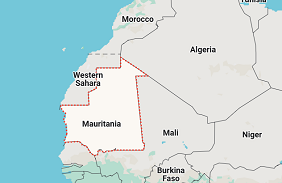The IMF Executive Board concluded today the 2024 Article IV consultation with Mauritania and also completed the Third Reviews under the 42‑month blended Extended Credit Facility arrangement (ECF) and the Extended Fund Facility arrangement (EFF), and the Second Review under the Resilience and Sustainability Facility arrangement (RSF).
The decision allows for an immediate disbursement of SDR 36.16 million (about US$ 47.4 million). The ECF/EFF were approved by the IMF Executive Board in January 2023 (see PR 23/15) and the RSF was approved in December 2023. The completion of the reviews allows for the immediate disbursement of SDR 6.44 million (about US$ 8.4 million) under the ECF/EFF and of SDR 29.72 million (about US$ 39.0 million) under the RSF, bringing the cumulative disbursements to SDR 89.7 million (about $ 117.7 million). The Executive Board also approved the modification of the quantitative performance criterion on new debt contracted or guaranteed by the government for 2024, with public debt remaining at moderate risk of debt distress.
The Mauritanian economy has remained resilient, leveraging the government’s continued reform efforts, with economic activity projected to slow to 4.6 percent in 2024 driven by a contraction in the extractive activities. Following further deceleration in 2025-26, growth is expected to remain favorable in the medium term. Risks are tilted to the downside and include the escalation of regional instability and extreme climate events.
Continuing with prudent rule-based fiscal policy supported through revenue mobilization, particularly by streamlining tax exemptions would help create policy space for infrastructure and social spending while preserving debt sustainability. The ongoing reforms in the financial sector, including enhancing banking supervision and enforcing prudential norms, will help broaden access to finance and strengthen the banking system as an engine of growth. Acceleration of structural reforms, including through continued efforts to bolster governance, the business environment, and the regulatory landscape, are critical for the diversification of the economy and to achieve job-rich inclusive growth.
Program performance has been strong along its three pillars of fiscal sustainability, flexibilization of the exchange rate and governance reforms. All end-June 2024 quantitative targets were met, and most of the structural benchmarks (under the ECF/EFF) and all reform measures (under the RSF) were implemented.
Following the Executive Board discussion, Kenji Okamura, Deputy Managing Director and Acting Chair, made the following statement:
Backed by sound policies, Mauritania’s economy continued to grow in 2024, inflation remains contained, and the fiscal performance remained in line with the medium-term goal of declining external debt. Strong program performance has been supported by prudent monetary and fiscal policies. The authorities are focused on enhancing policy frameworks, strengthening resilience, accelerating inclusive growth, and mitigating the challenges posed by climate change.
Implementation and institutionalization of a fiscal anchor would help shield public expenditure from volatile commodity prices and reduce external public debt. Disciplined fiscal policy accompanied by fiscal and customs administration reforms could create the fiscal space needed to address the significant infrastructure and social development needs, while preserving the credibility of the medium-term budgetary framework. Key measures aim to broaden the tax base, improve tax administration, and eliminate excessive exemptions. It will also be important to enhance the efficiency of public investment.
As inflation remained contained, the Central Bank of Mauritania has appropriately narrowed the interest rate corridor and reduced the policy rate. The authorities are focused on enhancing the monetary policy framework and minimizing excess liquidity to help keep inflation anchored and develop interbank markets. Continued efforts to strengthen the central bank’s supervisory functions and independence are important. Careful monitoring of financial sector developments and continued enforcement of prudential regulation would strengthen the banking sector’s resilience to shocks. Further steps to enhance the AML/CFT framework and improve the functioning of the foreign exchange market and enhance exchange rate flexibility are important.
Decisive implementation of structural reforms is key to support higher, more inclusive and diversified, private-sector-led growth. Priorities include strengthening governance and transparency, promoting financial sector development and inclusion, and implementing the governance action plan to improve the business environment.
Continued implementation of the ambitious climate change adaptation and mitigation reform measures, supported by the Resilience and Sustainability Facility, will help address Mauritania’s medium- and long-term term challenges and catalyze additional financing.

